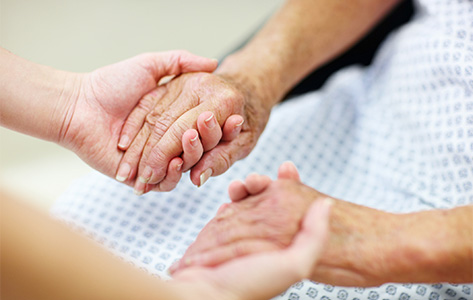Atlantic Health System medical centers provide a safe and secure environment for all patients. Unfortunately, even when careful measures are taken, accidental falls occur. These falls can cause injury to the patient and may result in the need for a prolonged hospital stay, additional treatments, or even surgery. Falls are distressing to the patient, as well as to the family and hospital personnel.

Atlantic Health System takes important steps to reduce the risk of patient falls.
First, every patient is assessed at the time of admission for his/her personal risk of falling. Information such as age, diagnosis, medications, surgery, or a recent fall or accident is used to determine risk.
Once a patient has been identified as being at risk for a fall, preventive measures are instituted.
Why Do Falls Happen?
Health problems which affect the vision, balance, or movement of joints and muscles such as:
- Cataracts
- Arthritis
- Urinary urgency
- Low blood pressure with standing
- Parkinson’s Disease
- Stroke
- Confusion
- Alzheimer’s Disease
Medications which may make you feel dizzy or disoriented including:
- Tranquilizers
- Sleeping pills
- Pain relievers
- Blood pressure pills
- Laxatives
Treatments which may leave you feeling weak or unsteady on your feet such as:
- Radiology tests
- Recent surgery
- Long periods of bedrest
- More than one day without food
- Use of enemas
Safety Suggestions
- Wear slippers or shoes with non-slip soles. If you cannot obtain this footwear, be sure to tell your nurse.
- Turn on the light in your room and wear your eyeglasses so you can see more clearly.
- Call for assistance if the side rail or equipment needs adjustment.
- Follow instructions regarding whether you must stay in bed, have assistance to get out of bed, or use an assistive device such as a cane or walker.
- Ask for help before getting out of chair, bed or leaving the bathroom. Use the call light, and wait for assistance.
- If you are permitted to get out of bed without waiting for help, sit at the bedside before standing. Then, rise slowly and walk carefully when out of bed. Do not lean or support yourself on rolling objects such as IV poles or your bedside table.
- When possible, your friends and family are allowed to stay with you. They can go along with you to test and treatments.
A Special Note to Family and Friends
There may be times when extra companionship would be beneficial to the patient’s comfort or safety. These times often include sundown, nighttime, a change in room or routine, and a change in his or her medical condition. The nurse may discuss several options with you for ensuring the maximum safety of your loved one.
Please do not hesitate to share your concerns about the patient’s needs with the nursing staff.